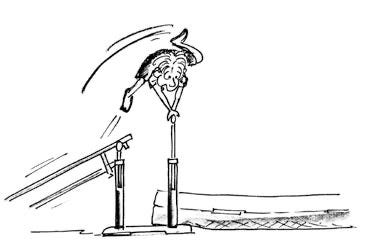Let's start.
Hi.
I got married one and a half times, but this does not make me a wedding or married life expert.
Yet, paradoxically, such one time and a half helped me develop a body of knowledge that anybody even slightly interested in avoiding married life’s classic mistakes would make good use of. Anybody, in fact. It seems obvious, but avoiding them (the classic mistakes, that is) could be something comparable to hurdle jumping: if you’re not an Olympic Champion, sooner or later you’ll break a bone. But it so happens that, in trying, if you pay enough attention, you may as well develop the body of knowledge mentioned above.

That’s applicable to married life.
Weddings, however, as in ceremonies and parties, deserve a different treatment.
Once you’ve done one, you might know exactly how to do the second, how to do your brother’s, how to do your other brother’s, how to do it for your cousin who wants to get married in the countryside, or for that girlfriend of yours who wants to get married in the city, how to do it when they ask you to do the speech or some church reading, or when you’d love to read something but nobody asks you to, or the wedding you’d kill to go to but nobody invites you.

Because, if it’s true that so many people are super happy when they can avoid to go to their friend’s, their cousin’s or their colleague’s wedding (always, inevitably, scheduled for the middle of the Summer, right when you’ve finally booked that vacation that you had been dreaming about for ages), and not getting invited would be a huge gift, for me it’s the exact opposite: not only am I eagerly present, but I’m the first one to get there the day of the event, the one who has gone wedding dress shopping with the bride-to-be, the one who directs the florist when he/she decorates, who tells the photographer how to shoot, and what have you. Unbearable, but precious.
My first wedding was a dream. I got married in a private historic mansion on the hills of Central Italy and, back then and there, I was sure I was living the perfect wedding. Then I learned, and actually, perfect have been the weddings of all those I mentioned above, those whom I literally tortured to get across a concept of perfection often so poorly recognizable.
When my second quasi-husband proposed, it was a Summer night and I instantly, in a split second, easily imagined everything. Everything seemed to be in its right place that very moment: the moon was full, the month was July, the sky under which he proposed was that of Tuscany (Under the Tuscan Sun, even though it was night), and he was on his knees. In the imagination of any romantic comedy film director, those would all be essential tiles of a perfect mosaic. The prelude of a married life (hum, let’s skip that for a moment) and a wedding ceremony to die for. And five years from that perfect night I’ve just finished to define the most incredible details of a ceremony that’s nowhere in sight. He then changed his mind and forgot to tell me, but that’s a different story.

Well, I’d like to look for the silver lining in this whole story (there’s always a silver lining) and start writing about how, when and why a wedding ceremony becomes unique.
Every Sunday, straight to your mailbox, The Wedding Newsletter will tell you about pieces of a past life, pieces of other successful weddings, and pieces of something that will give you the idea you were looking for to plan your wedding, the one that has to be absolutely perfect.
This pandemic will end, but in the meantime we can use our time to read, understand, think, choose and plan.
Your big day is just around the corner you must be ready!



